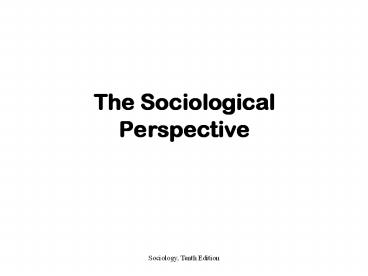The Sociological Perspective PowerPoint PPT Presentation
1 / 20
Title: The Sociological Perspective
1
The Sociological Perspective
2
What Is Sociology?
- ...The systematic study of human society
- Systematic
- Scientific discipline that focuses attention on
patterns of behavior - Human society
- Group behavior is primary focus How groups
influence individuals and vice versa - At the heart of sociology
- The sociological perspective which offers a
unique view of society
3
Why Take Sociology?
- Education and liberal arts
- Well-rounded as a person
- Social expectations
- More appreciation for diversity
- The global village
- Domestic social marginality
- Enhanced life chances
- Micro and macro understanding
- Increase social potentials
4
Benefits of the Sociological Perspective
- Helps us assess the truth of common sense
- Helps us assess both opportunities and
constraints in our lives - Empowers us to be active participants in our
society - Helps us live in a diverse world
5
Importance of Global Perspective
- Where we live makes a great difference in shaping
our lives - Societies throughout the world are increasingly
interconnected through technology and economics - Many problems that we faced in the united states
are more serious elsewhere - Thinking globally is a good way to learn more
about ourselves
6
Global Map 1-2 Economic Development in Global
Perspective
7
The Sociological PerspectivePeter Berger
- Seeing the general in the particular
- Sociologists identify general social patterns in
the behavior of particular individuals - Individuals are uniquebut
- Societys social forces shape us into kinds of
people - Seeing the strange in the familiar
- Giving up the idea that human behavior is simply
a matter of what people decide to do - Understanding that society shapes our lives
8
Durkheims Study of Suicide
- Emile Durkheims research showed that society
affects even our most personal choices. - More likely to commit male protestants who were
wealthy and unmarried. - Less likely to commit male JEWS and CATHOLICS
who were poor and married. - One of the basic findings why?
- The differences between these groups had to do
with social integration. - Those with strong social ties had less of a
chance of COMMITING suicide.
9
Figure 1-1 Rate of Death by Suicide, by Race
and Sex, for the United States
10
C. Wright Mills Sociological Imagination
- The power of the sociological perspective lies
not just in changing individual lives but in
transforming society - Society, not peoples personal failings is the
cause of social problems - The sociological imagination transforms personal
problems into public issues
11
THE ORIGINS OF SOCIOLOGY
- One of the youngest of academic disciplines,
sociology has it origins in powerful social
forces - Social Change
- Industrialization, urbanization, political
revolution, and a new awareness of society - Science
- 3-Stages Theological, Metaphysical Scientific
- Positivism a way of understanding based on
science - Gender Race
- These important contributions have been pushed to
the margins of society
12
Sociological Theory
- Theory a statement of how and why facts are
related - Explains social behavior to the real world
- Theoretical paradigm a set of fundamental
assumptions that guides thinking - Three major approaches
- Structural-functional
- Social-conflict
- Symbolic-interaction
13
Structural Functional Paradigm
- The basics
- A macro-level orientation, concerned with broad
patterns that shape society as a whole - Views society as a complex system whose parts
work together to promote solidarity and stability
- Key elements
- Social structure refers to any relatively stable
patterns of social behavior found in social
institutions - Social function refers to the consequences for
the operation of society as a whole
14
Whos Who in Structural-Functional Paradigm
- Auguste Comte
- Importance of social integration during times of
rapid change - Emile Durkheim
- Helped establish sociology as a university
discipline - Herbert Spencer
- Compared society to the human body, organic
approach - Talcott parsons
- Sought to identify tasks that every society must
perform - Robert K. Merton
- Manifest functions are recognized and intended
consequences - Latent functions are unrecognized and unintended
consequences - Social dysfunctions are undesirable consequences
15
Social-Conflict Paradigm
- The basics
- A macro-oriented paradigm
- Views society as an arena of inequality that
generates conflict and social change - Key elements
- Society is structured in ways to benefit a few at
the expense of the majority - Factors such as race, sex, class, and age are
linked to social inequality - Dominant group vs. Minority group relations
- Incompatible interests and major differences
16
Whos Who in Social-Conflict Paradigm
- Karl Marx
- The importance of social class in inequality and
social conflict - W.E.B. DuBois
- Race as the major problem facing the United
States in the twentieth century
17
Symbolic Interaction Paradigm
- The basics
- A micro-level orientation, a close-up focus on
social interactions in specific situations - Views society as the product of everyday
interactions of individuals - Key elements
- Society is nothing more than the shared reality
that people construct as they interact with one
another - Society is a complex, ever-changing mosaic of
subjective meanings
18
Whos Who in Symbolic-Interaction Paradigm
- Max Weber
- Understanding a setting from the people in it
- George Herbert Mead
- How we build personalities form social experience
- Erving Goffman
- Dramaturgical analysis
- George Homans Peter Blau
- Social-exchange analysis
19
Critical Evaluation
- Structural-Functional
- Too broad, ignores inequalities of social class,
race gender, focuses on stability at the
expense of conflict - Social-Conflict
- Too broad, ignores how shared values and mutual
interdependence unify society, pursues political
goals - Symbolic-Interaction
- Ignores larger social structures, effects of
culture, factors such as class, gender race
20
(No Transcript)

